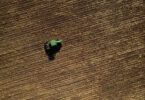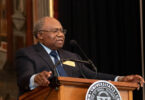Athens, Ga. – Fans at the University of Georgia’s Homecoming football game Oct. 18 probably will be the first people in nearly a century to hear a band play a jaunty march that is believed to be UGA’s first school song but has been lost for decades.
UGA’s Redcoat Band will play the “Red and Black March” as part of a half time show featuring traditional UGA songs and music. The band will use a score created by its long-time arranger, Tom Wallace, based on a piano version of the march that was discovered earlier this year on eBay.
It probably will be the first time the march has been played by a band since it was composed in 1908 by R. E. Haughey, who directed a small military band at UGA from 1905 to 1909.
No one is sure if that band, which over the years grew into the Redcoat Band, played the march. But it is known that the music disappeared decades ago and the only reference to it was in a 1962 history of the Redcoat Band that refers to the march as “Georgia’s first original school song.”
It resurfaced this summer when Lloyd Winstead, associate director of UGA’s Willson Center for Humanities and Arts and a former Redcoat, happened upon a piano arrangement while searching eBay for material for his doctoral dissertation. Winstead bought the piece from a music store in North Dakota for $12.50 and in June gave a copy to Redcoat Band officials, who asked Wallace to rearrange it for performance by the 350-member band.
The Redcoats will premiere the “Red and Black March” as the centerpiece of the half time show for the Georgia-Vanderbilt game in Sanford Stadium, which is Georgia’s Homecoming game.
Turning the 100-year-old piano piece into an arrangement for hundreds of wind instruments wasn’t particularly daunting, said Wallace, who played trumpet with the Redcoats as a UGA student and has been arranging for the band since 1976.
“You listen to the piano music and use your imagination to hear what the band would sound like when playing it,” he said. “You can’t just take the exact notes and slap them on a band score. You assign proper notes to the band instruments in such a way that it projects like band music instead of piano music.”
In addition to using the written piano score, Wallace listened to a recording made this summer of a UGA music professor playing the march on the piano.
He used a computer with a built-in synthesizer that replicates band instruments, allowing him to hear how notes will sound on different instruments. His final orchestration retains the basic tune and harmonies of the march, though he did transpose the piece to a different key that he said is more practical for wind instruments.
He gave his finished score for wind instruments to John Cypert, another former Redcoat, who prepared percussion parts.
The “Red and Black March” has similarities to marches composed around the same time by John Philip Sousa but “is certainly distinctive and has a voice and style all its own,” Wallace said. “It’s a neat little piece.”
Wallace, who holds bachelor’s and master’s degrees in music composition and taught music theory and composition at UGA before becoming a full-time arranger, has arranged older tunes, such as Stephen Foster folk songs. But he said the historical connection to UGA makes this march special.
“I knew of Mr. Haughey and his place in the band’s history, and to be able to work on a piece he composed for the university that was discovered out of nowhere is very exciting,” he said. “I’m glad everyone will get to hear it and I’m honored to be doing this.”
Wallace said he may extract a short section of the score and arrange it for the band to play during timeouts in games, making it a “true modern-day fight song.”
Mike Robinson, Redcoat Band director, said the band is excited to reintroduce the march. “It’s an honor to be the first Redcoat Band to perform this rediscovered piece,” he said. “The traditions at UGA are so extensive, and to have a connection with the earliest years of the band program is really special. This piece may become a staple in the Redcoats’ repertoire.”







